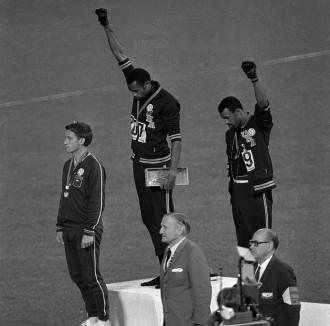
So Tommie Smith and John Carlos get to go to Washington, D.C. next week, to the White House, to be received by President Obama with the 2016 United States Olympic team. Who are they and why is this such a big deal?
Smith and Carlos are the American Olympians who raised their fists during the playing of the national anthem during the victory ceremony–their victory ceremony–at the Mexico City Games in 1968. The gesture remains one of the most iconic images in all of sport history, and it has been referenced frequently in recent months with the emergence of a whole new era of African American athletic activism.
My first book was on Smith and Carlos and their demonstration, and over the course of the past few months I’ve been working on a project to situate the current era of athletic awareness in the context of the activism of 1968. Too often in sports, if not society more generally, we have a tendency to confine history–especially the history of racism and injustice as well as conflict and struggle–to the past. Without getting lost in the details, here’s a few facts about the history that I think are still relevant today.
- Smith and Carlos’ 1968 demonstration was not the spontaneous gesture of two isolated, discontented individuals; rather, it was the culmination of a year-long effort of activism and advocacy (famously titled “The Revolt of the Black Athlete”).
- The athletic activism of 1968 was not directed against prejudice and discrimination in the world of sport; rather, it grew out of the desire of socially-conscious, politically-committed African American athletes to use the publicity and platform of sport to contribute to larger, societal struggles against racism and injustice.
- Smith and Carlos were not celebrated by most Americans back in 1968, much less received at the White House for their demonstration. They were kicked off the team in Mexico City and treated as outlaws, villains, and traitors back home.

Comments